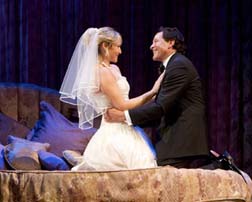|
Lucy KomisarMay, Allen and Coen depict the weird, funny, and bizarre of families in "Relatively Speaking""Relatively Speaking." Weird is relative, you might say about the characters in these three rather bizarre comedies about relatives as a connecting theme. The self-involvement of a wife when her husband dies, the revelations set off by a couple who flee a wedding at which one was to be wed, the impact of marital conflict on an unborn son, everything turns on the unexpected, which of course is what makes memorable comedy. My favorite, "George is Dead" by Elaine May, takes absurdity from normalcy but pushes it to the outrageous. Doreen (a brilliantly deadpan Marlo Thomas), arrives late at night dressed in a pink cocktail dress and sweetly bullies her way into the apartment of Carla (an all-suffering Lisa Emery). She announces that her husband "George is dead." He died in Aspen. Why seek solace at Carla’s? Her mother 40 years ago was nanny to Doreen’s kids. So Carla, the daughter-of-servant, is ordered to be a servant again. May offers delicious commentary on the super-rich and their willing class-defined servants. Doreen holds her coat out with the expectation that Carla will catch it. And she does!
A master of irony, May has Doreen declare (the play’s most unforgettable line), "I don’t have the depth to feel this bad." She actually doesn’t feel bad. She says about George, "He was so boring," and "What will I do?" She’s thinking about next husband. Besides, life is so complicated. She is distraught at all the decisions she has to make, what to tell the staff: the furs come back from storage, where do they go? The kids aren’t around to help. She explains that they live in Switzerland; they can come home only for six months or they get taxed. She is in some ways childlike, but also a master manipulator, and Carla is a ready victim. She orders Carla to prepare a snack: Brie or Stilton. She wants the TV brought to the couch. She requires Carla’s nightgown. Meanwhile, Carla’s husband Michael (Grant Shaud), a high school teacher, is giving a speech at a meeting of Amnesty International. His human sensitivity does not extend to his wife, whom he berates over the phone for not attending the talk. Carla was dealing with problems of her own mother. Why is Carla walked on by everyone, and why does she take it? The clue will be mama. Elaine May, always brilliant, has written a play about class and gender, showing the deadly controlling power of the combination.
Woody Allen’s "Honeymoon Motel" opens with a charming Fred Astair singing "I’m old-fashioned." The characters in this play are anything but. Jerry Spector (Steve Guttenberg) has run off with his stepson’s bride, Nina Roth (Ari Graynor), to the Starlite motel, which, she comments repeatedly, is very "tacky." It is. So are she and Jerry. She is hungry and wants pizza: "Do they deliver, because I deliver." The play takes off a bit on Allen’s own life, which featured his eloping with his girlfriend Mia Farrow’s adopted daughter. Father and stepson are both writers. But rather than a soap opera, this is more a Jewish sitcom. One by one, the family, parents and groom, arrive at the motel room. The best running shtick belongs to the rabbi (Richard Libertini) who, when he refers to one of the family members, segues into a eulogy. Rabbi: "A father runs off with another member of the tribe’s beloved. A good father, a loving father, a decent provider, a man who supported his family by the sweat of his brow – Jerry Spector born to Rose and Myron Spector – attended City College, served his country in the Navy, – Vayichoo hashimayem." You get the idea. Allen puts his life philosophy in the mouth of Sal Buonacotti (Danny Hoch) the pizza delivery guy. Buonacotti? In Italian, "well cooked." First he deflates some literary pretension. When Sal identifies himself, the jilted groom Paul (Bill Army) declares, "Not the head of the literary department at Amherst?" Sal replied, "We never delivered any pizzas to Amherst, it’s too far." Then we get Allen’s explanation for taking his own very young bride. Sal says, "I’ve learned that life is short and there are no rules. Yes, Nina was scheduled to marry Paul but the human heart is so unpredictable. For whatever combination of miraculous reasons she and Jerry have fallen in love and while it defies conventional logic or science or religion, it’s yet a reality. My advice is to accept it, go with the flow, try not to be embittered and move on with life – which as I say is short and why waste it squabbling and resisting the inevitable." Whatever you think of that, "Honeymoon Motel" is a very funny play.
"Talking Cure" by Ethan Coen is a lot
darker, but also on the mark in deflating pretentiousness. Larry
(Danny Hoch) is in a mental institution, talking to an equally
very-New York-accented doctor (Jason Kravits). Larry is smarter than the doctor, testing him, jousting. The doctor says "Larry, you’re a very good boxer. You slip punches. And while I might admire the skill, while the crowd might admire the skill of such a boxer, at a certain point they want him to engage. They want the contact, the exchange, to take place." Larry replies, "They want one fighter to beat the living shit out of the other and pound his head against the canvas and break all the bones in his face so it’s just a rubbery, bloody piece of smush. That’s what the crowd wants." So how did a guy that’s so smart (he cites Newton and Kepler) get that way? Meet his parents before he was born, while he was in the womb. It’s the 1950s. His mother is pregnant. She and her husband are waiting for dinner guests, who are late. They fight, like the boxer Larry described, except the weapons are words. Wife (Katherine Borowitz): You said, "We haven’t seen Maurice and Dodi in quite a while." So I invited them. Husband (Allen Lewis Rickman): So if I’d said, We haven’t seen the Hitlers in quite a while—you’d invite Hitler? Wife: First of all, Reuben, there’s no such couple as "the Hitlers." Even a close personal friend of Hitler, Eva Braun, does not say, "Let’s have the Hitlers over. We owe the Hitlers a dinner." In the history of socializing the words "Let’s have the Hitlers over" have never been spoken. The combat goes on. The wife asks, "Will it be "shutup" when the child gets here?" The husband: "When the child gets here"—He’s out-of-state?" And the wife, "My point all the more so—Larry’s here as we speak!" Indeed he was. This is quintessential Coen: dark – weird – black comedy. Husbands and wives, parents and kids; that’s the stuff of most stories, comedies and dramas. But these one-acters are built around destruction; self-less love when it raises up (Carla) gets beaten down. Still, the saccharine doesn’t make comedy, and this somewhat cynical evening is clever and reflective of the exceptional talents of the writers. And of director John Turturro who makes you believe that these absurd events are happening even when you know deep down that can’t be so. | lobby | search
| home | cue-to-cue |
discounts | welcome | film
| dance | reviews
| |
||||||




